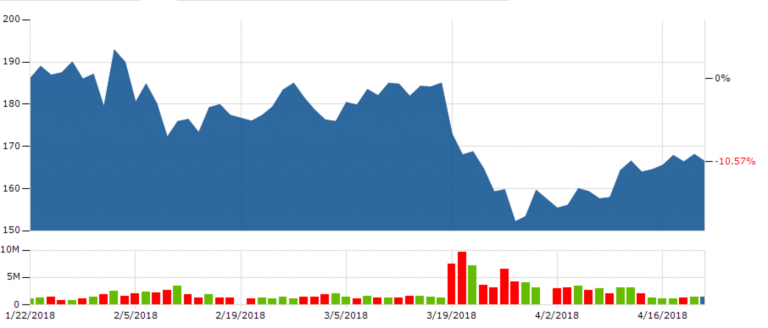
Facebook: Just another corporation
by Regina Ho
In today’s world, we are surrounded by corporations of many different kinds, ranging from fast food chains like McDonald’s to retail chains such as Walmart. These corporations appeal to the masses, and they sell us things. However, in this post, I would like to bring to attention corporations that do not sell us any tangible object, the social media. Social media companies generate revenue mainly through advertisements, not by selling the public any material goods. Social media are widely used by many corporations in an attempt to reach out to their audiences, but we often forget that they are corporations themselves. In this article, I hope to be able to show that, in the end, social media firms are just like any other corporation, that they are affected by the same matters any other global corporations are, perhaps even more given the nature of the internet.
Recently, the Facebook and Cambridge Analytica scandal brought to attention the concern regarding our online privacy. It is not a surprise that our information has been used by online companies. Google tracks our location almost constantly, giving us real-time information about how to get to the next location on our agenda, and most sites use cookies to track how often we do what on their pages, where we come from and where we are heading. This exploitation of people’s data has been extended even to messaging applications such as Whatsapp, where users can allow each other to see their real-time locations for a certain amount of time.
While it is evident that there have been issues with privacy and online platforms for the longest time, the Cambridge Analytica scandal has caused the biggest public outcry so far. This would largely be because there have been links from the scandal to the 2016 American elections and the problems with fake news affecting election results. Facebook’s involvement in this scandal was simply that of a platform for a quiz-app that gathered the information. All the information harvesting was carried out with the knowledge of the users of the quiz application, but it failed to inform the users what their information would be used for. Facebook’s failed to ensure that Cambridge Analytica could not use the data for any other purposes.

Figure 1 – Stocks fell following news of Cambridge Analytica’s relation with the Trump campaign
When news first broke about the links that Cambridge Analytica had to the Trump campaign and how they used user information, Facebook stocks closed at 6% lower on the 19th of March, causing the company to lose about $30 billion in market value. Due to the continued media attention, Facebook’s CEO Mark Zuckerberg was forced to face the US Senate where they questioned the company over its privacy measures, as well as the issue of news and advertising. Even though a large part of the Zuckerberg’s Senate-hearing was about the politics of posting and of pages being banned, media and the public have focused on the idea of individual privacy on social media platforms.
This focus on privacy and on the manner in which Facebook has essentially broken the confidence of their users and has led to a new low in their trust in the platform, with less than 30% of users believing that Facebook was committed to their privacy. The #deletefacebook campaign was also started, prompting many to delete their accounts to show their objection to the company’s privacy policies. This campaign has brought even more media attention after famous people such as Tesla’s Elon Musk, actor Will Ferrell, and Whatsapp co-founder Brian Acton all jumped on the bandwagon. Although these kinds of boycotts “do not actually shape consumer preferences” (King and Pearce, 2010, pg. 256), #deletefacebook has shown to be a clear sign of the lack of trust in the brand.
 This movement, along with the scarring of Facebook’s reputation by the media, has led to the company making a show of changing user privacy settings. Just opening up the application on my phone has prompted a screen asking me to choose how and what details of my profile I wish to share with whom. This is a sign that perhaps things are starting to change with privacy after the media attention that this scandal has brought. Like any other corporation that caters to the public, Facebook has to change its ways after such public outcry over its policies or risk losing more of its consumers.
This movement, along with the scarring of Facebook’s reputation by the media, has led to the company making a show of changing user privacy settings. Just opening up the application on my phone has prompted a screen asking me to choose how and what details of my profile I wish to share with whom. This is a sign that perhaps things are starting to change with privacy after the media attention that this scandal has brought. Like any other corporation that caters to the public, Facebook has to change its ways after such public outcry over its policies or risk losing more of its consumers.
There are other ways to challenge a corporation into making changes to the way it runs the business. These strategies can similarly be applied to social media platforms. King and Pearce mention a strategy of “creating new markets and categories” (King and Pearce, 2010, pg. 258). This might well be a more effective method of combatting the problems currently experienced with Facebook. Social media are a part of everyday’s life for many of us, and instead of deleting our accounts, which to be honest is not going to make a significant difference, the platform can be used to stage movements for change. In recent years, social media have been a key component in global justice movements such as Occupy 2011 and more. The nature of social media has allowed for “largely unfettered deliberation and coordination of action” (Castells, 2015, pg. 10). There is no reason that this new form of social movements, one that is centred in digital media cannot be used against a company centred on digital media. Examples of such movements have been coming up with the setting up of co-op sharing sites where, in theory, the people own their content.
In conclusion, Facebook, and all other social media platforms are just like any other corporations in the world. They need to make changes to maintain their business, especially in the face of social movements against them. And like the movements to change other corporations, boycotts are not the only nor the most effective way of changing the market.
Bibliography (Offline sources)
King, B.G. and Pearce, N.A. (2010) “The Contentiousness of Markets: Politics, Social Movements, and Institutional Change in Markets” Annual Review of Sociology. Vol. 36: 249-267
Castells, M. (2015) “Opening: Networking Minds, Creating Meaning, Contesting Power” in Networks of Outrage and Hope: Social Movements in the Internet Age, pg. 1-20

0 Comments